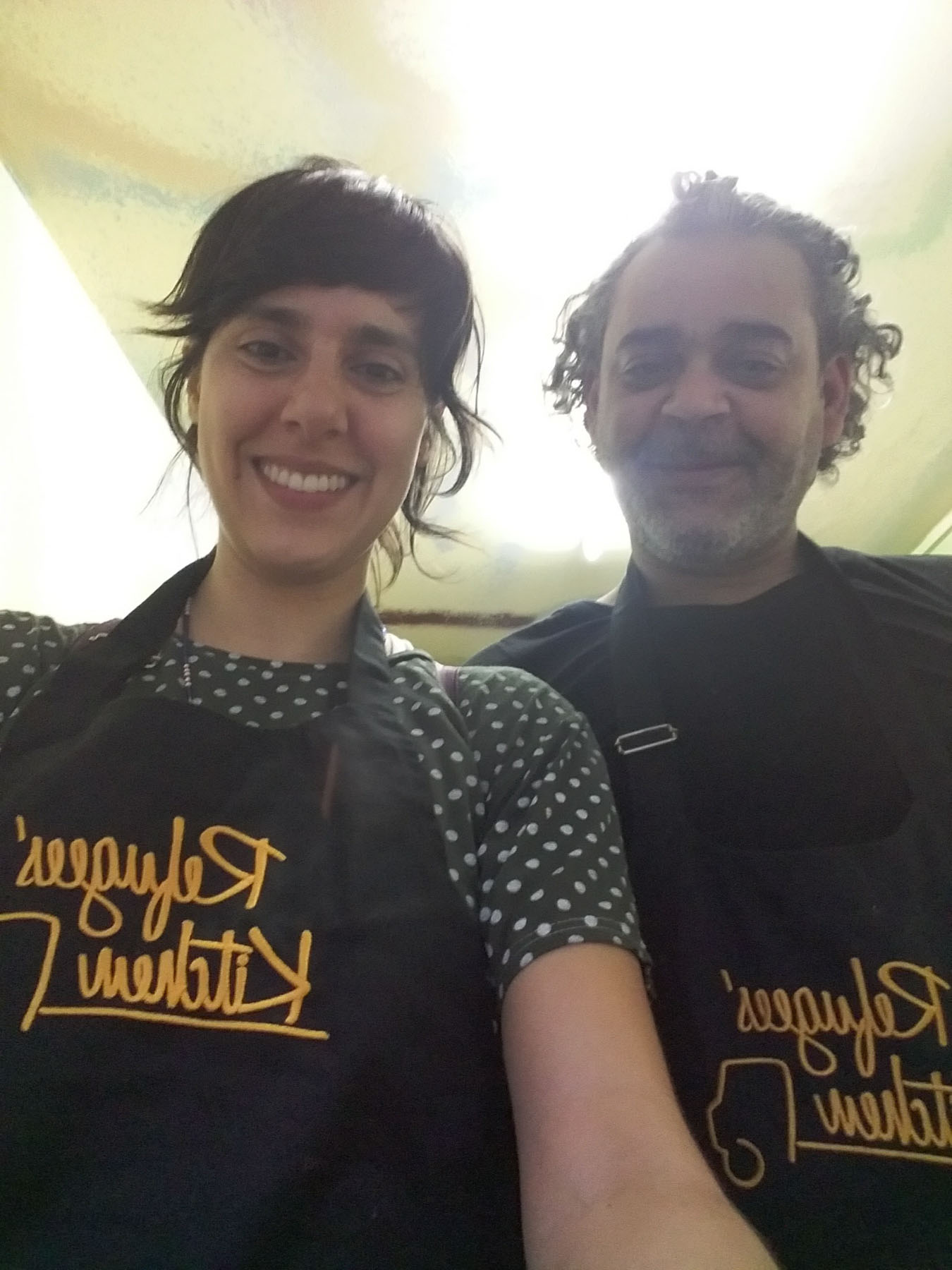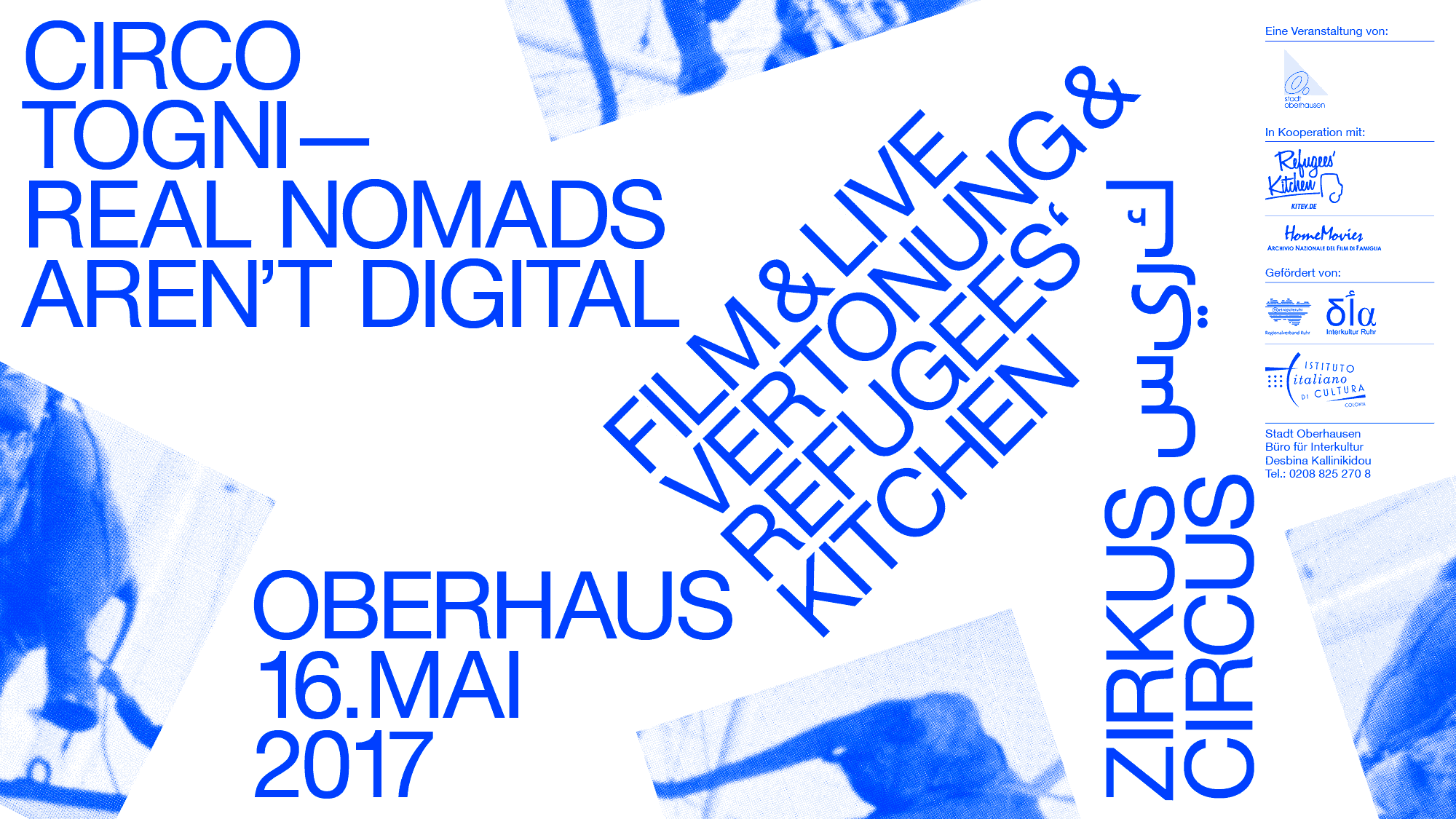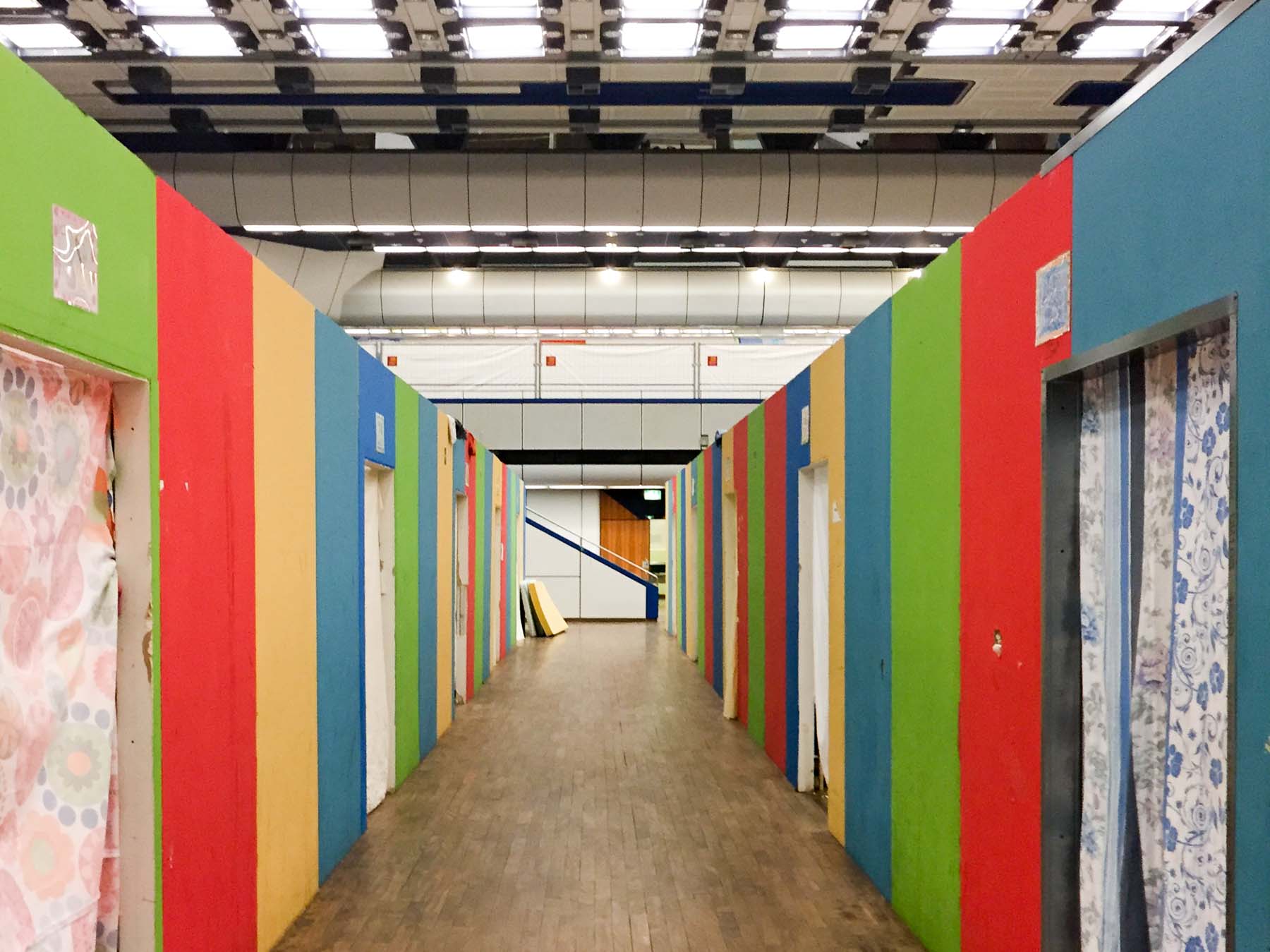Design Research in Oberhausen
Warum sich Marcela Ceballos aus Kolumbien und aktuell Masterstudentin in Dessau, entschieden hat, doch länger in Oberhausen zu bleiben, könnt ihr in ihrem persönlichen Bericht auf dem Oberhaus-Blog lesen:

Manege frei im Oberhaus

Flyer von felixpeter.us
Knapp eine Woche ist es nun her, da tummelte sich filmbegeistertes Publikum in der Friedrich-Karl-Straße. Denn Kitev und das Büro für Interkultur der Stadt Oberhausen luden vergangenen Dienstag ins Oberhaus, wo sich der Leerstand im Erdgeschoss diesmal in einen kleinen Kinosaal verwandelte. Anlass war die Vorführung des italienischen Films «Circo Togni».
Ein wunderschöner Film, der Privataufnahmen der Zirkusfamilie Togni aus den 40ern bis 70er Jahren zeigt und dabei live atmosphärisch von einem Trio mit E-Gitarre, Djoze-Kniegeige, Klarinette und Saxophon vertont wird. Entdeckt und Restauriert wurde das Fimmaterial im Archivio Nazionale del Film di Famiglia in Bologna. Der Stummfilm zeigt Szenen aus dem Leben einer Zirkusfamilie, die mit ihrer Handvoll Elefanten es Hannibal gleicht tat und somit bewies, dass die Alpen doch mit den großen Dickhäutern zu überqueren sind. Das Publikum konnte anschließend ihre Fragen persönlich an den Archivleiter und den Restaurator stellen, die sich die Reise nach Oberhausen nicht entgehen ließen.
Mit ihnen waren es viele Oberhausener*innen, sowie zahlreiche internationale Gäste, die einen wunderschönen Abend erlebten, welcher neben Hören und Sehen, auch das Schmecken und Bestaunen nicht unbeachtet ließ. Das Team der Refugees´ Kitchen stellte ein arabisch/italienisches Anti-Pasti-Buffet zusammen, ein Jongleur wirbelte währenddessen seine Kegel in den Oberhausener Abendhimmel und bei immer noch sommerlich warmen Temperaturen mundete auch jedem der italienische Landwein ganz vorzüglich.
So bunt, international und tolerant ein Zirkus ist, verbreitete sich dieses Lebensgefühl auch unter den Gästen an diesem Abend. Wir danken Geremia Carrara, dem Musiker Alessandro Palmitessa und Interkultur Ruhr, sowie dem Büro für Interkultur für diese großartige Veranstaltung.....und wir lassen jederzeit wieder die Leinwand für euch runter!the whole rigmarole
It is just a week ago that film-interested folks were gathering in the Friedrich-Karl Street. Because kitev and the office for interculture of the city of Oberhausen invited last tuesday to the Oberhaus where its abandoned ground floor turned into a small cinema. An italian film named «Circo Togni» was shown.
A beautiful film which shows private footage of the Italian circus family Togni starting in the 40s until the late 70s, supported by atmospheric sounds from a trio playing the electric guitar, Djoze-Kneevioline, clarinet and saxophone. Discovered and restored was the footage by the Archivio Nazionale del Film di Famiglia in Bologna. It shows the daily life of a family dedicated to the circus. And they made an expedition with their elephants, to prove that Hannibal was able to cross the Alps. Every question by the audience could be asked directly afterwards to the head of the archive and the conservator themselves who didn´t hesitate to make the trip to Oberhausen.
Many citizens of Oberhausen and several international guests thought so too and didn´t miss the chance to enjoy a wonderful evening which has reached all senses. The team of the refugees´ kitchen created a tasty arabic/italian Anti-Pasti-Buffet, a juggler was spinning bowling pins in the evening skyline of Oberhausen and the warm summerbreeze let everyone celebrate their glass of italian redwine.
As colourful, international and tolerant as a circus is, so was spreading this art of living among the guests on this evening. We have to say thank you to Geremia Carrara, the musician Alessandro Palmitessa, Interkultur Ruhr and the office for interculture in Oberhausen...... and be sure that we will always offer you a screen in Oberhausen!
Konferenz ‚Global Turkey in Europe‘ am 8.Mai 2017 und wir fahren nach Berlin

Es kam so: Eines Tages erreichte uns eine Einladung zur Konferenz „Global Turkey in Europe“ in Berlin. Der Untertitel der Konferenz lautete „Integration syrischer Geflüchteter in Deutschland und der Türkei – Herausforderungen und Perspektiven“ Wir waren also eingeladen von unseren Erfahrungen aus den Projekten zu berichten und in die Diskussion einzubringen. Auf einer Konferenz von Theoretiker_innen und Wissenschaftler_innen waren wir also diejenigen mit ganz praktischer „Felderfahrung“. Da wir außerdem zu dritt waren und einer von uns mit syrischem Migrationsvordergrund, konnten wir den Schnitt der anwesenden Syrer_innen um ⅓ anheben.
Es ging los mit einem „Ausflug“: Besucht wurde eine Sammelnotunterkunft im mittlerweile fast stillgelegten ICC (International Congress Center), einem futuristischem Bau der 70er Jahre. Laut einem Spiegelartikel vom 6. Mai dieses Jahres wohnen in ganz Deutschland nach wie vor 15.000 geflüchtete Menschen in Sammelunterkünften, davon 13.400 allein in Berlin und von diesen wiederum 600 im ICC, das seit zwei Jahren im Betrieb ist – ein baldiges Ende ist noch nicht in Sicht. Zur Erinnerung: Das Thema der Konferenz lautete „Integration“ und obwohl die sympathische Leiterin der Unterkunft vieles probiert (Sprachkurse, Vermittlung von Praktika, etc…) steht sie damit auf verlorenem Posten und die Bewohner im Abseits.
Man könnte meinen Sammelunterkunft + Integration = Thema verfehlt. Stimmt auch, obgleich sich die Runde trefflich entlang dieses Beispiels in das Wesentliche hinein diskutieren konnte.
Die Teilnehmer_innen waren gut gemischt: Italien, Griechenland, Tschechien, Deutschland, Polen, Syrien, Libanon, Niederlande, Groß Britannien und natürlich viele aus der Türkei.
Immer wieder ging es um die zwei grundverschiedenen Ansätze mit denen die beiden Länder Deutschland und Türkei operieren: halbwegs gut geregelte Zugänge zu Bildung, Gesundheitsversorgung und Arbeitsmarkt auf der einen Seite und informelle Strukturen, wenig staatliche Organisation und hauptsächlich ehrenamtliche, private, nachbarschaftliche Flüchtlingshilfe auf der anderen Seite. Erst spät reifte wohl in der Türkei die Einsicht, dass der Krieg in Syrien nicht schnell vorüber gehen würde und erst spät gab es Gesetzesänderungen, die den Geflüchteten Zugang zum Arbeitsmarkt ein bisschen erleichterten.
Und auch an Deutschland gab es fundamentale (und erheiternde) Kritik, so sagte Ahmad Abbas, einer unserer engagiertesten Köche aus der Refugees' Kitchen, in die große Runde: "Zu uns [Syrern] sagen immer alle, wir sollen uns integrieren, aber wenn man sich Deutschland so anschaut - die Deutschen selbst sind nicht besonders gut untereinander integriert: Sie sitzen jeweils alleine auf ihren Sofas vor dem Fernseher oder in ihren großen Autos und sprechen nicht miteinander..."
Interessant war der Tag und es zeigte sich wie wichtig ein bilateraler Austausch ist, aber: Reden allein reicht nicht. Und trotzdem stärkt es zivilgesellschaftliche Akteure und lässt ein Verständnis für die jeweilige Situation der Anderen wachsen, in einer Zeit, wo der gemeinsame (politische) Nenner immer kleiner zu werden scheint.
The conference "Global Turkey in Europe" and we are going to Berlin.
One day we received an invitation to the conference "Global Turkey in Europe" in Berlin. The subtitle of the conference was "Integration of Syrian refugees in Germany and Turkey - Challenges and Perspectives". We were invited to report on our experiences from the projects (like our Refugees' Kitchen) and to contribute to the discussion. At a conference of theorists and scientists, we were the ones with a very practical "field experience". Since we were also a threesome, and one of us with a Syrian migration foreground, we were able to increase the average of Syrians up to 33%.
It started with an "excursion" to an emergency refugee shelter in the almost inactive ICC (International Congress Center), a futuristic building from the 70s. According to an article in Der Spiegel from 6th May this year, 15,000 refugees still live in collective accommodation, of which 13,400 are living in Berlin and 600 of them in the ICC, which has been now in operation for two years - an imminent end is not yet in sight. As a reminder, the theme of the conference was "Integration", and although the sympathetic leader of the accommodation is trying a lot (language courses, placement of internships, etc ...), she is in a lost position and the inhabitants are on the sidelines. If you think, collective refugee shelter + integration = missing the point you're right. Although on behalf of this example the round could discuss into the essentials of integration.
The participants were well mixed: Italy, Greece, the Czech Republic, Germany, Poland, Syria, Lebanon, Netherlands, Great Britain and of course many from Turkey. And we were discussing the two entirely different approaches of Germany and Turkey: reasonably well-regulated access to education, health care and the labour market on the one hand, and informal structures, little state organisation and mainly voluntary, private, neighbourly refugee aid on the other hand. It was lately that Turkey gradually realised, that the war in Syria would not pass quickly and that changes in the law are necessary to make it easier for the refugees to gain access to the labour market.
But Germany too was exposed to fierce (and amusing) criticism. Ahmad Abbas, our very engaged cook in the Refugees’ Kitchen was saying: „To us [Syrians] everyone says, you have to integrate yourself into the society, but, honestly, when we look on the Germans, they themselves are poorly integrated: Sitting ALONE in big cars or on sofas watching TV, without going out and talking to each other…“
Interesting was the day and it showed the importance of a bilateral exchange, but: Talking is not enough. And yet, it strengthens civil society actors and enables the growth of understanding for the situation of others, at a time when the common (political) denominator seems to be getting smaller and smaller.



















